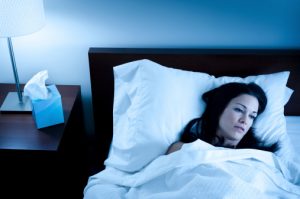
Easy fixes for common sleep problems
Snoring
If you are still tired after waking up in the morning and even have a headache, you could have sleep apnea. Sleep apnea is a condition that causes an individual to stop breathing numerous times a night. When the brain clues in to the lack of oxygen it abruptly awakens the patient and kick starts breathing again.
To determine if you have sleep apnea, you can undergo a sleep test where you will be monitored during sleep. If you are diagnosed, your doctor may recommend a continuous positive airway pressure (CPAP) machine. This device is strapped onto a person’s face like a mask and air continuously flows to prevent any blockages from occurring. Better yet, without the snoring, your partner can begin to get better sleep as well.
Teeth grinding
If you are a teeth grinder – a doctor or dentist will be able to tell – a dentist will fit you for a mouth guard. By taking a mould of your mouth the dentist creates a custom fit guard to act as a protective layer between your top and bottom teeth. Another way to prevent teeth grinding is to reduce stress and anxiety. Take necessary steps to wind down and calm down prior to bed or, better yet, clear your head.
Restless legs
Although each person is different, common ways to treat restless leg syndrome involve using cold or hot packs on your legs, getting massages or even taking a bath. Speaking with your doctor can also help narrow down the cause of restless leg syndrome, and the doctor may prescribe medication to help combat it as well.
Your body’s clock is off
Ways to improve DSPS involve creating proper sleep hygiene, cutting back on caffeine, avoiding the use of technology or TV prior to sleep, and creating a wind-down routine to tell your body it’s time to sleep. When these methods don’t work a doctor may prescribe melatonin supplements or even light therapy.
Your body depends on sleep, so if you’re not getting at least seven hours, it’s about time you start being proactive about regaining your sleep. Lack of sleep has been linked to a higher risk of cardiovascular disease and diabetes. So, if you want the most out of your health, do what you can to improve your sleep.
Related Reading:
Insomnia and poor sleep quality are hypertension risks
When it comes to high blood pressure – or hypertension – there are many factors that come into play: Diet, weight, smoking and alcohol use can all be attributed to your rising blood pressure. In fact, lack of sleep is also a factor. Getting a good night’s rest not only determines your energy level the next day, but plays a large role in hypertension. Continue reading…
Sleep apnea may increase gout risk due to hyperuricemia: Study
Sleep apnea has been found to increase gout risk due to hyperuricemia, according to new research. Sleep apnea is a sleep disorder that causes the individual to wake up out of breath, and gout is a form of arthritis, which can be triggered by consuming foods high in purines. Continue reading…
Sources:
http://www.health.com/health/article
http://www.health.com/health/article